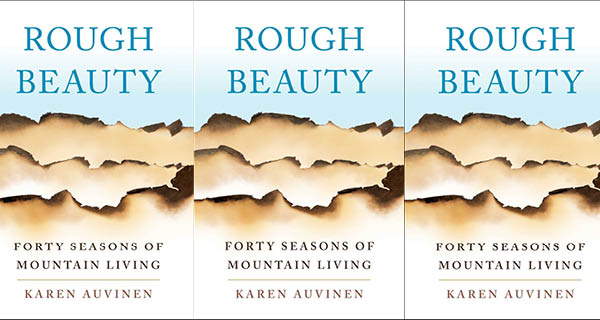
By Estefania Lemus
Lighthouse instructor Karen Auvinen's memoir, Rough Beauty: Forty Seasons of Mountain Living, came out in June 2018 from Scribner. We chatted with her about writing, teaching, and genre-jumping. She'll be teaching two workshops, 4-Week: From Memory to Memoir in Louisville, starting September 11, and The Sense of a Beginning: Where and How to Start Your Memoir (as part of Lighthouse North Writers Fest) on October 6. Learn more about her below.
Q) You’ve used poetry as a means of expression for years, but your most recent publication shifted from that style of writing to a more narrative type of work. What made you want to write a memoir?
A) It's possible to sell a nonfiction proposal, as I did with Rough Beauty, to a publisher—part of my mission to be a working writer. Alas, everyone knows that poetry will not pay the bills, but they should also know that poets are natural memoirists. The attention to language you have with poetry lends itself to making an evocative piece of nonfiction. Think The Meadow by James Galvin. But for the record, my MA is in poetry and my PhD is in fiction writing and I’m published in all three literary genres.
Q) Your most recent work explores loss, vulnerability, and growth. Did you find it difficult to express these emotions? Was embracing the town you lived in as big a change as you imagined it would be?
A) I tried very hard to tell the story of my life by thinking of myself as a character. This practice gives a memoirist crucial distance so that emotion can be revealed without being indulged. A good writer opens up a world for the reader to enter; if there is too much emoting from the author, this isn’t possible. Remember a reader reads to go on a journey not hear about one. This said, some passages of the book were more difficult than others, and I tried to be honest and open without being self-pitying even when situations were plainly hard. In the end, I arrived at a certain perspective that surprised me, and yes, I was also surprised at what I decided to reveal, but a book has a momentum all its own and the writer should always follow it.
Q) What do you encourage your students to work on most in their writing?
A) I try to help students get out of the way. To learn to let the story have a say in what wants to happen. I encourage intuition and letting the words show the path. But in the end, good writing is grounded in the body and in the details of the physical world, so my students work a lot on painting the picture as fully as possible, slowing it down to catch the details, and getting out of their heads. This, and voice. It’s not about what happened but how you tell the story.
Q) Do you see yourself continuing the path as a memoir writer, or do you want to explore other forms of writing?
A) I have a collection of short fiction—stories about the American West—I’m shopping around, as well as a collection of poems called The Bodhisattva of Love. I’m considering writing about the 2013 flood in Jamestown, which wouldn’t be straight up memoir. I want to write it all.
Q) Your newest book is called Rough Beauty. Why did you choose the word rough to describe beauty in the title?
A) The title comes from a passage in the book where I say, “I prefer the earth with its rough beauty its mixture of shit and muck.” I think the world is a more beautiful place for all its imperfections—and that’s exactly how I see my life.
Q) You engage with place a lot in your book. Would you say that’s tied to the mountain region, or do you think it’s rooted in something else?
A) I am a total mountain girl. It’s the place I most feel like myself and the place I came to know myself best. An important part of my writing practice is “writing weather and birds,” taking down the details of what’s going on outside the window. In wild places, I find this kind of practice much more interesting. There’s so much outside the human world going on. Plus, I need the space, the quiet of mountain living. I like to see stars at night. It makes me feel grounded and better equipped to deal with the distractions of modern life. I can imagine living in other mountain places, but my heart belongs to Colorado. And I hope not to live in the flatlands or the city ever again.
Karen Auvinen is poet, mountain woman, life-long westerner, writer, and the author of the memoir Rough Beauty: Forty Seasons of Mountain Living (Scribner June 2018). Her body of work traverses the intersection of landscape and place, examining what it means to live deeply and voluptuously, and has appeared in The New York Times, among others. Awards include two Pushcart Prize nominations and two Academy of American Poets Awards. Past gigs include Writer-in-Residence for the State of Colorado. Currently, she teaches film, storytelling, and media studies to freshman at the University of Colorado Boulder.
Estefania Lemus is a fall intern at Lighthouse.

